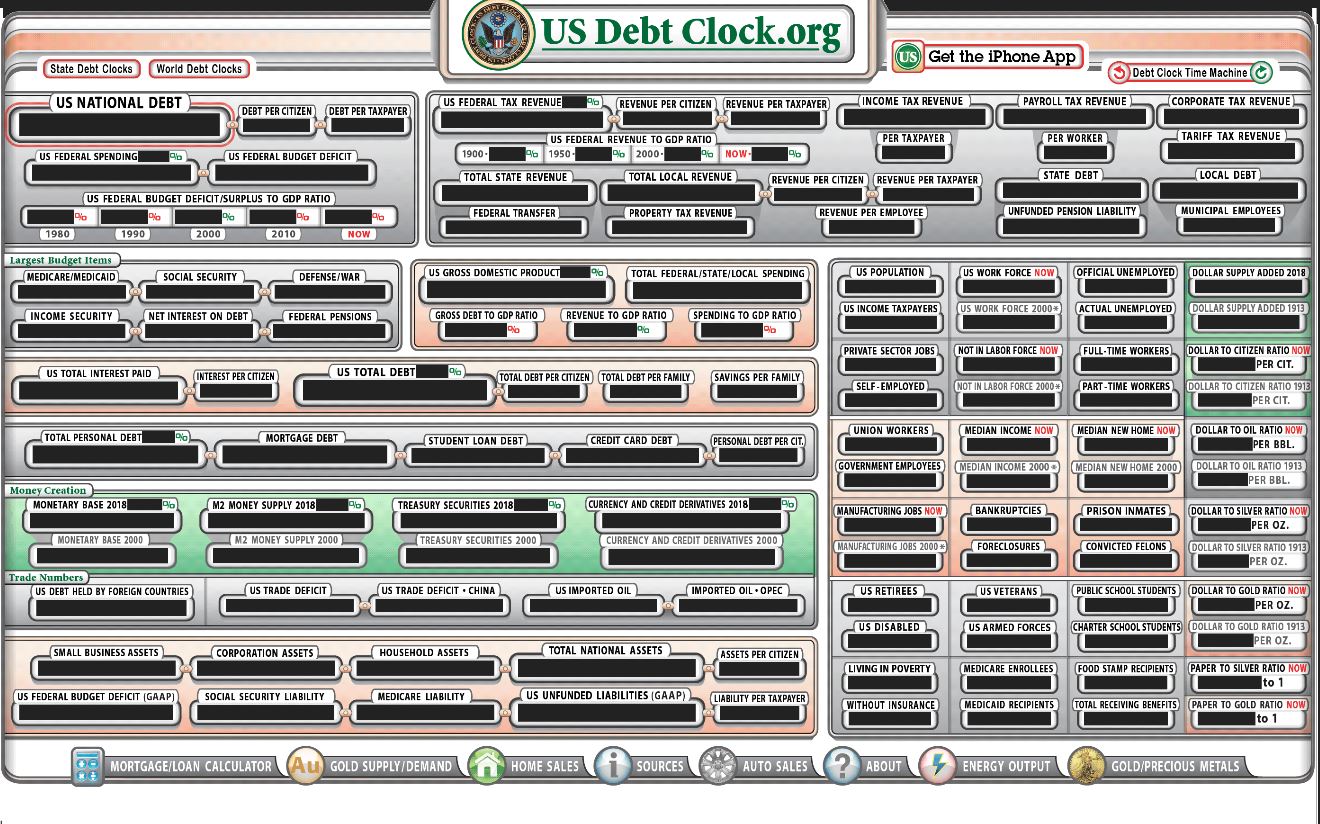The US economy is propelling full steam ahead. With the current unemployment rate of 3.9%, as of July 2018, the booming stock market, consumer confidence riding high, and most current matrix exceeding the wildest expectations, why look at the negative? Even if you think that ‘The Art of the Deal’ is full of rubbish, how come its author is our President, and the glass ceiling-shattering, almost overqualified politician, we were supposedly not even worthy of having, was found wondering the forest around Chappaqua looking for peace? Yes, Republicans spent 8 years screaming that entitlement programs and Obama’s socialist approach ballooned the national debt – seemingly the only black spot on the face of our nation. Yet, even they decided that more debt isn’t necessarily bad, as long as the right people holding our country together are the ones making the bulk of the money. Just look at the tax cut of 2017. Paul Ryan finally realized his childhood dream, with the help of a certain Apprentice star, and was clearly so satisfied with his lifelong accomplishment, that he decided to leave the world of politics (then again, so did Hillary, 4 years before she ran for President). It added an extra trillion dollars to the debt (yes, 12 zeroes), and yet all indicators keep on pointing to a strong and healthy economy, even with the semi-trade war going on.
How about some numbers then? The current US debt rises too fast to give the exact number, but it’s approximately $21.35 trillion. That translates to just over $65,000 per every citizen, not so bad, right? Well, it’s over $175,000 per tax-paying citizen. Doesn’t seem like much if you own Facebook or Berkshire Hathaway, or even if you are an executive at a small-sized hedge fund, but it likely seems scary to the average US earner, making about $59,000 per year. How scary is it thou and will those numbers ever catch up to us? While there is no current economic Nostradamus out there and not even Warren Buffett bets a 1,000, some predictions are meant to be made. After all, trading doesn’t happen on Wall Street because people guess the right numbers, ala lottery.
Since the times of Cold War, socialism, mostly coming from USSR, as a stepping stone on the path of teachings of Karl Marx, became symmetrical with other USSR-related phobias, as totalitarian regime, having no freedom of voice and choice, as well a number of atrocities, committed in the name of achieving the Communistic Bright Future of all mankind. Near nuclear conflicts, occupation of countless countries, even individual assassinations, have been attributed to the Cold War conflicts. Looking back it seems odd, that the occupation of Iraq by the US forces is justified in the name of freedom, but occupation of Yugoslavia by Soviet forces, for instance, also in the name of freedom, albeit a different version of it, was proclaimed as a near atrocity. Nonetheless, the facts are clear, USSR collapsed, and the US is still standing, and to the victor goes the spoils, even if victory is only marked by sustainability. Ideological animosity toward Russia and USSR remained, and it translated to similar feelings toward socialism. When Obama was called a socialist, it was meant as an insult, not that he truly cares about the everyday people. As a matter of fact, it was the very people socialism is meant to protect, like the agricultural workers of Wisconsin and factory laborers of Detroit, who were some of the unhappiest citizens under Obama’s Presidentship, although it was Obama, not his predecessor, who insisted on bailing out the auto industry in 2008.
Big companies made the most money under Republican Presidents for as long as the tally was kept, yet it was the Democratic Presidents, who saved the US economy during hardships, be it FDR and his New Deal or Obama and his efforts to save the crumbling economy past G.W./Cheney combo and the 2 still ongoing wars. Democrats established Social Security, Welfare, affordable healthcare, federal minimum wage, and a slew of other programs meant to help everyday people. Why is it then, that Democrats don’t win in every election? Their actions sound like they would be widely welcomed by most, if not all.
Ideology is the answer. It is the US ideology, which separated us from every other country in the world. It is the US ideology, which coined the phrase ‘The American Dream‘ and made the US stand out despite the long list of atrocities committed, be it stealing the land from Native Americans; slavery; countless wars, like those in Vietnam, Cambodia, Afghanistan, Iraq; or even the initial support for Hitler, as he rose to prominence.
Fast forward to possibly the most unexpected, turbulent and scandalous Presidential election our country has ever seen and enter Bernie Sanders. In a seemingly ‘out of left field’ way, he proudly proclaimed socialistic values, and took on the entire country, likely sinking Hillary Clinton’s Presidential aspirations, despite losing the primaries, while introducing concepts like free higher education for all. With almost $1.5 trillion in student debt, again, why didn’t he win? It seemed like such a great thing not to owe money to meet what appears to be the minimum standard for a good job.
Again, the answer is ‘ideology’. It is the ‘carrot on a stick’, otherwise known as The American Dream, which promises every person the opportunity to rise above all others and be a star. Who doesn’t want to be a star, or at least a chance at becoming one? Those afraid of the spotlight and overachieving are likely also afraid of changes, and everyone likes to at least feel in control of their destiny, even if not actually in control.
It may seem like this becomes a question of human psychology and it shouldn’t be surprising. The US of A has long been riding the ideological wave. First, it was the strive for religious liberties, with Mayflower arriving to the unknown shores to practice religion in a strange land without persecution; outlawing slavery ahead of most of the world, despite being heavily dependent on slave labor; and of course the Crown Jewel of our country – The US Constitution, which gave people the freedoms unheard of in the rest of the world at that time. Our reach is vast and global, we don’t just influence, but determine the way the world operates, and we certainly have the privileged lifestyles here. Even in the Western countries, like Netherland, they pay $6.48 per gallon of gas, while even with the recent rise in prices, the average price of gas in the US is only $3 per gallon. Doesn’t seem like such a big difference considering that Netherlands only has 16,000 square miles to the US’ ~3,800,000 square miles, but the large consumption doesn’t quite justify an over 100% price difference. The larger question is whether we’re ok with 1% of our population holding 38% of all private wealth.
There were always rich and poor people, but as the US developed its middle class, the American Dream prospered and seemingly justified all our country has done. Only about 50 years ago an average US man could work for the Post Office and mortgage a house, with a stay-at-home wife and a couple of kids. Now it seems like an absurd dream, with the average salary of post office worker at under $53,000, when even rent in a decent neighborhood seems unobtainable. When wealth is inappropriately distributed, sooner or later people will rise up, right? Look at the Soviet Revolution of 1917, the Chinese Revolution of 1949, or a slew of other uprisings and revolutions throughout civilizations. Where is that same US revolution, we should be experiencing, as ‘rich get richer and poor get poorer’? The answer is simple. We’re right in the middle of it. Whether you support Bernie or Trump, if you miss Obama or think that Alexandria Ocasio-Cortez is the new face of our country, you stand for change. All of those names, as many others in today’s politics, new, like the ex-bartender Alexandria; or old, like Bernie, who held his first office back in 1981, long before a lot of his followers were even born, share one thing in common: they all stood for change. There are arguments to be made for why Bernie’s ideas are utopian, or that Trump lies, or that a 29-year-old with no political experience doesn’t belong there, or that Obama’s image was far more meaningful, than his deeds. Still, they all proclaim radical changes. Now, the difference between Trump and Bernie is purely political, but they are both isolationists. Obama looked beyond borders so much, that he was often liked in other parts of the world more than locally. After the previous Presidency, which became synchronous with the 2 still ongoing wars, and caused for the global perception of our country to sink a great deal, it was a good step toward addressing the unnecessary animosity, but was Obama a visionary or just another biased politician is for the history books to ascertain.
Back to the national debt of a few million dollars more, than it was just earlier today. Is it even a bad thing? There are arguments for and against it. Supposedly the government knows what it’s doing, as our country is still running with less inefficiencies than most others. Perhaps a different figure will put it into perspective. Think your personal debt, be it the money you owe to credit cards, mortgages, student loans or perhaps a banking line of credit. Household debt just reached $13.3 trillion. With about 126 million households in the US, that translates to about $105.6 thousands per household. Granted, 9 trillion of it is mortgage debt, and real estate holds value in itself. Of course, most people don’t buy a home and sell it later and rather live there, but for the sake of the argument, let’s see how much we owe for other items. It comes out to just over $34,000 per household. If you make the national average of $59,000 per year, which really means more like $40,000 after taxes, 34 grand sounds rather hefty.
What do we do with a combined national and personal debt of nearing $35 trillion? It keeps on significantly rising faster than it takes for you to read this. The only time since 1970 the US had a balanced budget, meaning that national debt wasn’t rising, was under Bill Clinton, and he did it largely by raising taxes on the wealthy and increasing Social Security contributions. It seems that the current economic system, which since Bill Clinton has been friendly to businesses either through Bush’s tax cuts or through Obama’s efforts to save us from the Great Recession, just hasn’t been capable of not increasing our national and individual financial liability. Yes, the good economic conditions of today, with still lower rates of Obama-era Federal Reserve efforts, promote borrowing for individuals, but compared to less than $4.3 trillion national debt of China, the $35 trillion number appears rather excessive. Even with the 138% increase in Federal spending now the U.S. federal government spending for 2019 is $4.407 trillion. That means that the entire US government spends only about 12.6% per year of the amount it owes. In other words it would take 8 years of no spending at all to repay that debt. Of course the US isn’t the Communist Romania and someone like Ceaușescu has no place here, but it does put things in perspective.
The seemingly easy way to get rid of debt, US, or any other country, is to cancel it altogether, sort of like they did in USSR. No more private ownership, no more individual governments, no more egos, no more capitalism. The government owns everything and takes care of its people, everyone works together toward a common goal, and things like education, healthcare, apartments, and so on are provided at no cost to all citizens. Only it didn’t work out so well in the Soviet Union, and even the attempt to ‘erase borders’ in Europe, through forming European Union, has hit a lot of problems, as refugees from the troubled ends of our planet began to flow into the EU countries, changing their culture, and giving birth to nationalism all over. UK already chose to break off, and most other members don’t particularly enjoy the financial burden of caring the ‘troubled members’, like Spain and Greece. On one hand it’s a case in point that when borders get erased, further unification steps have to occur, but again, USSR tried that also, combining 15 Republics under the Russian umbrella. Most of the countries, which became the Soviet Republics, didn’t do it willingly, but were joined through some measure of force, which may be less prevalent now, yet still very active, as shown largely in the Middle East, Africa, and Asia.
US could lead the way, but we’re currently running the ‘America First’ path. Even Obama, with his excellent international ties, would never dare to introduce that idea. While those living in less privileged countries would happily welcome this notion, the American citizens don’t want to ‘play along’ with others very much, as it became evident when we elected our current President. Even those, who voted against him, would mostly refuse such a notion. Death from a nuclear war seems less and less likely, as the greatest nuclear and non-nuclear nations embarked on nuclear disarmament long ago. Global warming seems to be a more obvious current goal everyone has in common, but even the leader in the efforts of curbing its spread, the US, can’t decide if it’s manmade or just happening, despite scientific proof, and our current President doesn’t think we should even contribute $4.5 million dollars to stay in the Paris Accord, with Michael Bloomberg picking up that slack out of his own pocket.
Recent Gallup studies suggest that the younger Democrats are a bit more positive about socialism, than capitalism, but most from the same age group – 18 to 29, aren’t even that familiar with geography, and certainly lack the knowledge of what socialism means. With about 31% of voters being Democrats it is likely not the strength in numbers the effort would need. Even the Brexit voters had no idea what they chose, as most didn’t even quite understand the meaning of their votes. In addition, it would greatly change, if not destroy the idea of the ‘American Dream’. Even Governor Cuomo said that ‘America was never great’, but he was referring to things like racism and sexism raging on and opposing the President’s MAGA slogan, rather than proposing a fundamental change to our economic and political system.
Ayn Rand called the popular US term ‘free competition enforced by law’ a ‘grotesque contradiction in terms’ and she was right. Either we have free markets, or we have government control over markets. Yet the free markets approach caused the Great Depression, the Great Recession, and for majority of wealth to be accumulated by a tiny portion of our population. Too many government controls indeed make things look more and more like socialism. There is no middle ground known to people and proven by history. Yet, there was no such precedent to the French Revolution, to The Constitution of United States of America, to labor unions, and many other seemingly earth-shattering experiences in history. Same way there were no people, who said it quite as Aristotle, John Locke, Martin Luther King, and many other history-changing individuals. History chooses the time and place for all significant events and people to make their mark. It seems that we are entering the next moment, where a sublimation of sorts prove Darwin right once again. Let’s just hope that humanity has learnt beyond the most extreme occurrences, and we won’t perish, as the Roman Empire, Babylon, and even Tatar-Mongols once did. Let’s hope for a new brighter path, be an economic hybrid of capitalism and socialism or an entirely new concept we’re stumbling to discover. After all that’s the real dream of every human being – to survive. That’s when the national debt may not even be repaid but be long-forgotten.



